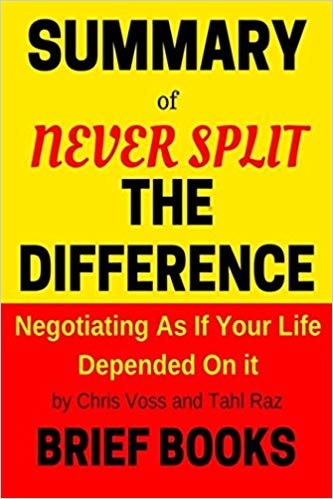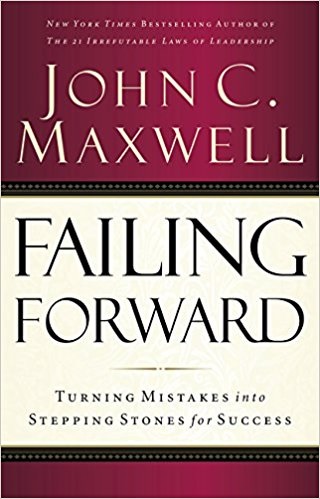By Suzanne LaKamp, OD, FAAO

Sept. 12, 2018
Business books can show you how to better manage your career and practice. Here are a few that made a big difference for me, showing me how to better communicate with colleagues and patients, and advance in the profession. It also taught me how to empower myself, so I could become the best doctor possible for my patients.
 Never Split the Difference: Negotiating As If Your Life Depended On It
Never Split the Difference: Negotiating As If Your Life Depended On It
by Chris Voss, Tahl Raz
The audio version can also be found on audible.com.
Why is this relevant to ODs?
Learning how to negotiate is relevant to all aspects of life. From personal to professional, we are always negotiating. Whether practice owner or employed, all ODs can benefit from improved negotiations, which is the result of effective communication.
What are the top takeaways for ODs from this book?
Most people want to avoid conflict. Difficult situations can also be big opportunities, however. Learning how to communicate with empathy, and work better with the other side in a conflict, can improve negotiation outcomes.
Building rapport using calibrated or careful questions, listening and mirroring principles, fosters trusting relationships. The principles in the book work for personal life, the business of running a practice and patient care.
How I’m Putting Lessons of the Book Into Action
Sometimes avoiding conflict can be harmful to a career. Not asking for a raise, or not asking for a better employment contract, can be a missed opportunity. Most people fear loss so much they would rather avoid asking for what they want than taking a risk for potential gain. It’s more important to ask for a good deal, and risk walking away, than to ever bargain for a bad deal. I have asked for certain provisions in employment contracts in the past, knowing it could jeopardize an opportunity if the other side didn’t see the value I provided. I trust what I have to offer, and prefer negotiation to settling for anything less
Don’t be afraid of the person in front of you. Negotiate with empathy. When providing care, rapport is essential to better outcomes and happier patients. I use open-ended questions, active listening, and create empathy to build trust with patients. Like Voss suggests, I rarely ask “why” questions anymore, which can trigger defensive responses, or use questions that yield simple yes-no responses. Asking “how” and “what” questions can bring more information, and the patient will have to engage.
When demonstrating the new TrueTear device, I now ask, “How would you like to help your dry eyes with a drug-free, drop-free device which works remarkably well?” Compare this to when I have previously asked, “Do you want to try this new dry eye therapy?” In the first example, patients feel empowered to work on their dry eye, whereas in the second example a patient may be fearful of just trying something new. Don’t provide the chance for a yes-no response. It can mean the difference between a happy patient and sale, and a lost opportunity.
Failing Forward: Turning Mistakes into Stepping Stones for Success
by John C. Maxwell
Why is this relevant to ODs?
In business, and personal life, failure is inevitable. It leads to inaction. It’s what keeps some ODs from running their own practice, as well as limits career opportunities. Failure is more common than success, and despite our best efforts, is unavoidable. If we can change our perception and response to failure, we can learn how to be successful. Adversity and challenge can lead to success, as long as we remain goal-driven.
What are the top takeaways for ODs from this book?
The perception and response to failure is what separates the high achievers from the rest. Failure is mostly subjective. You are the only one who can call yourself a failure, and let the feelings of it damage you.
Focusing on extremes sidetracks you from the goal and larger perspective. Redirecting focus on what is achievable and actionable yields results. Action, and moving forward, keeps you on track for a goal even if positive feelings aren’t there.
Flexibility and adaptability to change are important for running a successful business. Learning from what doesn’t work allows you to continue working toward what does.
How I’m Putting Lessons of the Book Into Action
If a professional situation is not going well, or causing a lot of stress, it’s important to look at fit for oneself and others. One practice type may not suit an optometrist-owner, or employee’s, goals, personality or beliefs. The right person in the right job is important for success. If one of these things doesn’t align, change the job, or change the entire situation.
When opportunities for growth were exhausted in a previous job, I switched practice type and am now very happy. I thankfully wasn’t stuck in a mental trap of my own perceived failure for leaving a job, and now am thriving in the newer environment. It was a good risk to take.
Our current practice uses surveys for patient satisfaction to track subjective outcomes. We also have monthly doctor’s meetings to relay potential changes to clinic operations or patient management. Listening to our patients, and sharing feedback with each other, is important. I like to give patients a lot of details about their eye and vision health.
I learned from feedback that this can be overwhelming, and cause stress for the patient. A patient who is happy with their vision, doesn’t need to hear about astigmatism measurements, for instance. I am learning better language, which is accurate but also helpful for the patient. It’s great to get constructive feedback from fellow doctors, and to be open to change.
The ultimate goal is taking care of patients and keeping them happy. Happier patients return for their annual exams, and refer family and friends.
 The 48 Laws of Power
The 48 Laws of Power
by Robert Greene
The audio version can also be found on audible.com.
Why is this relevant to ODs?
The book addresses laws of power through historical lessons of past leaders, important figures and government.
What are the top takeaways for ODs from this book?
Set yourself apart early in your career. Attach your reputation to a personal quality or quirk. Society enjoys people and businesses that stand out above the rest.
Take nothing personally, and limit defensiveness. Lack of your own emotional control is a weakness, whereas as controlling emotional responses is powerful.
How I’m Putting Lessons of the Book Into Action
A Millennial, I currently work in a predominantly refractive surgery practice with surgeons who have been in the field since the early beginnings of LASIK, and work with many more seasoned professionals. I once felt self-conscious about my younger age, but now hope I can use it to generate more enthusiasm for refractive surgery, especially among the younger ODs who are not as familiar with it.
Not reacting to anger or negativity diffuses a hostile situation. Not showing a strong response to another person’s anger puts the power back in your hands. Also, complaining about a negative situation or problem is unattractive to others, and doesn’t help your cause. If there is something I’m unhappy about, I will address it with my manager without emotion, and have a list of potential solutions ready.
Patients aren’t always happy customers. Problems arise. Sometimes patients can be angry and hostile. The natural reaction is to meet anger with anger. While some people feel powerful responding in such a manner, it decreases your power, as well as your online business reviews. Keeping calm with these patients can also lead to a potential solution. Listening is the best course of action while the patient is ranting in the chair. Turning unhappy patient experiences around enhances care and keeps business healthy, too.
These articles may also interest you:
Rate Your Dry Eye Center: 1-Year Report Card
Does Your Practice Need a Patient Counselor?
4 Steps to Increase On-the-Job Learning
 Suzanne LaKamp, OD, FAAO, is an associate at Durrie Vision in Overland Park, Kan. To contact: dr.suzanne.lakamp@gmail.com
Suzanne LaKamp, OD, FAAO, is an associate at Durrie Vision in Overland Park, Kan. To contact: dr.suzanne.lakamp@gmail.com



























